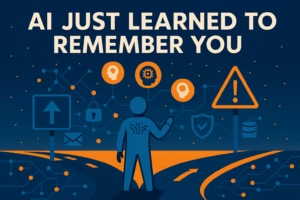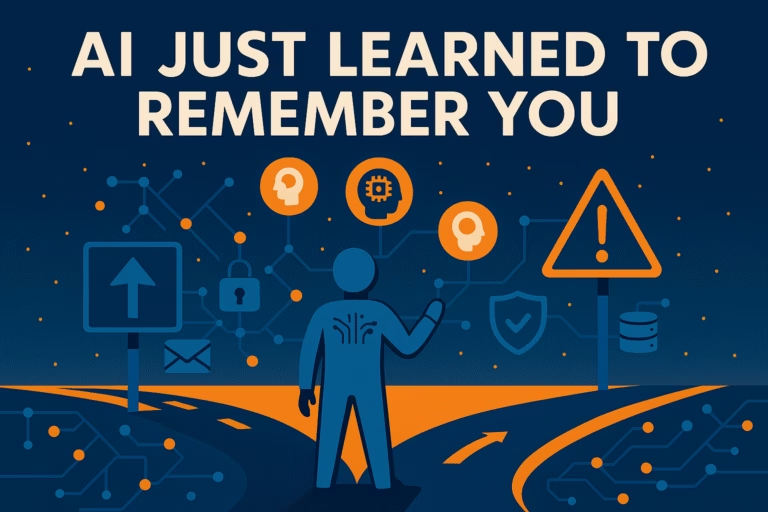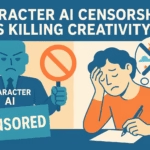- AI assistants like Claude now have memory, turning chats into ongoing relationships.
- Enterprise agents are powerful but fragile – messy data leads to fast mistakes.
- ChatGPT Atlas is turning the web itself into an AI interface with browsing and buying built in.
- Global experts are calling for restraint before creating intelligence that outruns control.
- The future belongs to trustworthy automation – tools like Blaze Autopilot prove that speed and safety can coexist.
AI Finally Remembers You – And Enterprises Are Paying the Price
The moment everyone quietly waited for just arrived. One of the biggest players in the field, Anthropic, just gave its assistant Claude something most chatbots never had: memory. It can now remember who you are, what you like, and what you were working on last time.
For years, people tolerated the same frustration; having to re-explain themselves in every chat. Now that loop might finally end. With this feature, your AI can act like a real teammate who actually recalls the previous meeting.
For developers, though, this is not just another update. Giving AI a memory is like opening a vault that never shuts. What it stores, how it recalls, and who controls that data are all new headaches waiting to happen.
Privacy and data governance now move from background noise to full-blown engineering priorities.
For businesses, the story flips. Instead of paying employees to feed context into the same model every morning, they can finally reuse all that knowledge across projects.
Compliance teams, marketers, analysts – everyone stands to gain hours a week. It’s the first time an AI can work on long projects without starting from zero.
And for casual users, this is the turning point where AI stops feeling like a toy and starts acting like a partner.
Imagine a version of ChatGPT that remembers what you told it about your business idea, your tone, your goals – and picks up exactly where you left off.
That’s not science fiction anymore. It’s the new normal.

The Reality Behind the Hype
While the headlines make it sound like the agent era has arrived, the truth is much messier. Big corporations are rushing to deploy “autonomous agents” across finance, health, and logistics.
The results look impressive on paper – one agent replacing dozens of analysts, reports done in minutes instead of days. But peek under the hood, and you’ll find cracks.
Nearly half of these companies admit they’re struggling just to connect their data. Some need to pull from eight or more systems just to make one agent function.
That’s before you even count the mistakes from bad or outdated information. In 2024, almost half of enterprise users confessed to acting on AI-generated data that turned out to be wrong.
The lesson? Speed without structure is chaos in fast-forward. AI doesn’t fix broken workflows; it amplifies them. Companies that treat agents like magic wands end up automating confusion.
The smart ones start smaller – organizing data, setting guardrails, and only then letting AI run the show.
As one VentureBeat analyst put it, the winners won’t be those with the smartest bots, but those who make them safe, consistent, and accountable.
When Browsers Start Thinking
OpenAI quietly made a move that changes how we’ll use the internet itself. They rolled out a new version of ChatGPT that isn’t just a chatbot anymore – it’s a full AI browser.
It can remember what you read, track your interests, keep tabs on tasks, and even make purchases for you inside the same chat window.
In plain terms, your browser just got a brain.
This new layer, called ChatGPT Atlas, is designed for a world where the AI no longer waits for you to search – it acts on your behalf. That might sound convenient, but it’s also the point where personal data becomes both the fuel and the risk.
The AI now knows what you buy, where you browse, and how you think. That’s more power than any single platform has ever had.
For developers, the message is simple: browser extensions are dead. The next decade belongs to native AI environments. Instead of adding AI into Chrome or Edge, OpenAI just built a browser around AI.
For businesses, this means the sales funnel collapses into a single chat – discovery, persuasion, and purchase all happen in one conversation. The companies that adapt to that will dominate e-commerce.
And for regular users, this is the internet growing up. It’s fast, personal, and dangerously easy to forget that you’re handing the wheel to an algorithm that learns from everything you do.
When the World Says Slow Down
Not everyone is thrilled about how fast things are moving. Over eight hundred global figures; scientists, CEOs, and even a few early AI pioneers – just signed an open letter calling for a pause on superintelligent systems.
Their point is simple: we can’t control what we don’t fully understand.
For the first time, the debate isn’t about whether AI should be regulated, but whether some kinds should exist at all.
The Future of Life Institute led the charge, warning that humanity is sprinting toward a level of intelligence that might outgrow us.
In truth, most users won’t feel this tension day to day. But the signal is clear. The world’s smartest people are worried that innovation has outpaced caution.
If governments pick up the same concern, 2026 could become the year when progress meets its first real red light.
Even investors are starting to whisper it: the next big AI breakthrough might not come from speed but from restraint.
What It All Means
AI just hit a milestone that changes the rules. Machines can now remember you, act for you, and make decisions that once needed a team of humans. The upside is enormous – faster workflows, smarter tools, endless personalization. But every layer of convenience hides a new layer of risk.
For companies, this means AI projects can no longer be weekend experiments. You need structure, clean data, and someone who understands both the tech and the business logic.
Otherwise, you’ll automate confusion at scale. For individuals, it’s time to start reading the fine print again. When an AI remembers you, it’s also recording you.
The real opportunity isn’t in building faster models; it’s in building trustworthy ones. The winners in this race won’t be those who deploy the most agents but those who can prove their agents won’t betray them. Tools like Blaze Autopilot are already showing that safe, human-supervised automation is the smarter bet.
The AI revolution is no longer about novelty. It’s about accountability. We’ve built the memory. Now we need to build the wisdom to use it.


